ACCESS LEADERSHIP NETWORK
Advocacy
The AcLN Advocacy team supports parishes in their efforts to bring about genuine belonging in the life of the church for all affected by disability. They seek to walk alongside people with disabilities to empower them to become their own best advocates.
The following testimonies are in response to this inquiry: Please share your experiences of inclusion (or lack thereof) in the church.If you would like to connect with others who care about disability ministry within the ACNA, please join the Access ACNA workgroup on Slack. Email Kathy Ayres for a link.
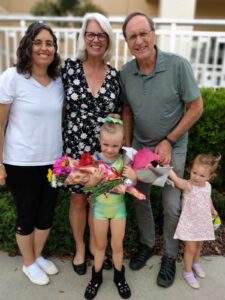
First, like many on the autism spectrum, I have sensory processing disorder with sound as my biggest trigger. The most hurtful response I’ve gotten in the church when trying to get the sound adjusted is, “wear earplugs.” The problem with wearing earplugs in a church service is that it is isolating. I might as well be in another room or watching online. In contrast, I once faced a situation where a bass guitar was making a sound that was like nails on a chalkboard to me and unpleasant to others. I was able to point out the specific sound to the worship team and sound person during practice before a service and they, in turn, were able to figure out how to get rid of the sound.
The second example is the response to my meltdowns, which involve tears and venting among other less than pleasant to deal with behaviors. The response often comes in the form of discipline that doesn’t help and often makes things worse. Having a meltdown is humiliating enough without being called un-Christ-like or treated like a child. I’ve also experienced helpful responses. Here is one example: I once had a meltdown in a small group setting. I made a beeline for the door. My group leader followed me, brought me back inside, and comforted me. It was one of the most loving things someone outside of my own family has ever done for me.
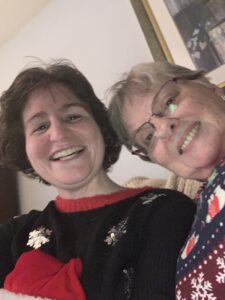
After accepting Christ, I brought undiagnosed/misdiagnosed disabilities among other relational dynamics that made mutual belonging in my church difficult. There was a process of healing from unhealthy relationship patterns that was enmeshed with my invisible disabilities. Our journey of belonging took hard work and commitment to develop healthy
relationships.
On the other side of this process, we now experience wonderful Christ- centered and balanced relationships that emanate belonging. We enjoy listening to each other and have a mutual recognition to utilize spiritual gifts/abilities to build up our local body of Christ. We are all able to reach out for help with navigating disability when needed. Knowing that my church family and I truly understand each other is a blessing.
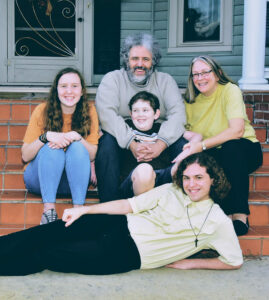
When we first received my son’s autism diagnosis and then later when things became more difficult with his care, our church community was there with emotional and prayer support for me and my husband personally, which meant the world. Our children’s ministry has accommodated Aidan at whatever level he was presently, even if that meant a 5-year-old in the nursery. Now, thanks to a few dedicated volunteers, we have a designated sensory room and specially designed curriculum and schedule for him on Sundays.
One of the things I appreciate the most about our church is how many people love to hear Aidan speaking his little phrases, even in quiet parts of the service. This has always been a source of stress to me but when others say it is a blessing to them it is a blessing to me. Even with all these positives, it still feels overwhelming sometimes to bring Aidan to church. This is just the nature of our situation. Without all the unconditional support and love, even I, a churchgoer from birth, might find myself drawing away from fellowship. I’m grateful for the level of support that our church family gives, and that we are able to remain in community and fellowship. I hope that more and more families will find this to be true of their church communities. This should be a vital part of our mission as the Body of Christ.
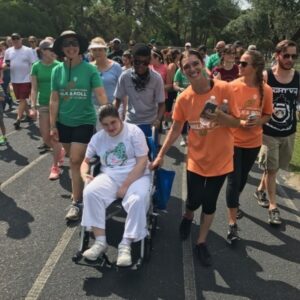
Families that include a member with disabilities require support and accommodation, but they also offer the church family so much. Our Lord says those who are weak and vulnerable are essential (1 Corinthians 12:22) to the Body. They ask us to love on a new level and shatter our beliefs of what church should look like. People who are often rejected by society need the welcoming acceptance and sense of belonging that flows easily from those who follow Christ.
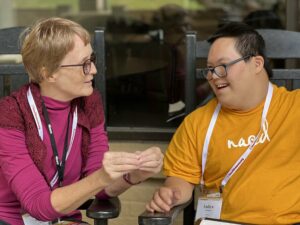
We are a family with 6 kids. Five are adopted with special needs: the eldest 2 are out of the home, the youngest 2 are grandkids that we adopted. It has been challenging to find a welcoming church home at times. Honestly when I was a parent of our first, as an only child, I had such pride. She was intellectual and compliant and sat quietly listening through church services. I actually had people ask me what we were doing to train her. I thought it was parenting; it was disposition. I reflect back because I get that many don’t get what it is like to raise kiddos with special needs. Yet some wonderful people and churches do.
We currently attend a church of 100-150 average attendance with a dedicated children’s ministry. What helps? Andrew, our Down Syndrome, 19-year-old is welcomed in ministry as an acolyte, homeless outreach PB&J sandwich maker, and sometimes Sunday School bell ringer or fill-in usher. He has a purpose. When Andrew doesn’t have a job, he can be disruptive. Other churches have told us, “When we see he can be quiet, we will let him participate.” That doesn’t happen unless you take the step of faith to give him the job. When we first came to our home church, we
were assured by the priest at least 3 times that a little noise didn’t bother anyone. Sunday School classes are hands-on for my ADHD son, and age structure is flexible to best meet developmental and sibling separation needs. Beyond this the church family regularly interacts with my kids and regularly tell me how they appreciate my kiddos’ participation in worship.
As a special needs mom, I’m often overwhelmed and regularly isolated even in a super supportive church, even though I chose this life. We value the local church [from another tradition] that has monthly Parent’s Night Out. We love the Special Olympics. A friend with a special son recently shared a letter her church sent out, listing local supportive ministries. I thought that was a brilliant ministry idea. If you’re reading this, you care. Thank you for that and your prayers.
